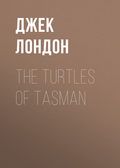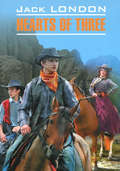
Джек Лондон
Adventure
CHAPTER XXV – THE HEAD-HUNTERS
The morning’s action had been settled the night before. Tudor was to stay behind in his banyan refuge and gather strength while the expedition proceeded. On the far chance that they might rescue even one solitary survivor of Tudor’s party, Joan was fixed in her determination to push on; and neither Sheldon nor Tudor could persuade her to remain quietly at the banyan tree while Sheldon went on and searched. With Tudor, Adamu Adam and Arahu were to stop as guards, the latter Tahitian being selected to remain because of a bad foot which had been brought about by stepping on one of the thorns concealed by the bushmen. It was evidently a slow poison, and not too strong, that the bushmen used, for the wounded Poonga-Poonga man was still alive, and though his swollen shoulder was enormous, the inflammation had already begun to go down. He, too, remained with Tudor.
Binu Charley led the way, by proxy, however, for, by means of the poisoned spear, he drove the captive bushman ahead. The run-way still ran through the dank and rotten jungle, and they knew no villages would be encountered till rising ground was gained. They plodded on, panting and sweating in the humid, stagnant air. They were immersed in a sea of wanton, prodigal vegetation. All about them the huge-rooted trees blocked their footing, while coiled and knotted climbers, of the girth of a man’s arm, were thrown from lofty branch to lofty branch, or hung in tangled masses like so many monstrous snakes. Lush-stalked plants, larger-leaved than the body of a man, exuded a sweaty moisture from all their surfaces. Here and there, banyan trees, like rocky islands, shouldered aside the streaming riot of vegetation between their crowded columns, showing portals and passages wherein all daylight was lost and only midnight gloom remained. Tree-ferns and mosses and a myriad other parasitic forms jostled with gay-coloured fungoid growths for room to live, and the very atmosphere itself seemed to afford clinging space to airy fairy creepers, light and delicate as gem-dust, tremulous with microscopic blooms. Pale-golden and vermilion orchids flaunted their unhealthy blossoms in the golden, dripping sunshine that filtered through the matted roof. It was the mysterious, evil forest, a charnel house of silence, wherein naught moved save strange tiny birds – the strangeness of them making the mystery more profound, for they flitted on noiseless wings, emitting neither song nor chirp, and they were mottled with morbid colours, having all the seeming of orchids, flying blossoms of sickness and decay.
He was caught by surprise, fifteen feet in the air above the path, in the forks of a many-branched tree. All saw him as he dropped like a shadow, naked as on his natal morn, landing springily on his bent knees, and like a shadow leaping along the run-way. It was hard for them to realize that it was a man, for he seemed a weird jungle spirit, a goblin of the forest. Only Binu Charley was not perturbed. He flung his poisoned spear over the head of the captive at the flitting form. It was a mighty cast, well intended, but the shadow, leaping, received the spear harmlessly between the legs, and, tripping upon it, was flung sprawling. Before he could get away, Binu Charley was upon him, clutching him by his snow-white hair. He was only a young man, and a dandy at that, his face blackened with charcoal, his hair whitened with wood-ashes, with the freshly severed tail of a wild pig thrust through his perforated nose, and two more thrust through his ears. His only other ornament was a necklace of human finger-bones. At sight of their other prisoner he chattered in a high querulous falsetto, with puckered brows and troubled, wild-animal eyes. He was disposed of along the middle of the line, one of the Poonga-Poonga men leading him at the end of a length of bark-rope.
The trail began to rise out of the jungle, dipping at times into festering hollows of unwholesome vegetation, but rising more and more over swelling, unseen hill-slopes or climbing steep hog-backs and rocky hummocks where the forest thinned and blue patches of sky appeared overhead.
“Close up he stop,” Binu Charley warned them in a whisper.
Even as he spoke, from high overhead came the deep resonant boom of a village drum. But the beat was slow, there was no panic in the sound. They were directly beneath the village, and they could hear the crowing of roosters, two women’s voices raised in brief dispute, and, once, the crying of a child. The run-way now became a deeply worn path, rising so steeply that several times the party paused for breath. The path never widened, and in places the feet and the rains of generations had scoured it till it was sunken twenty feet beneath the surface.
“One man with a rifle could hold it against a thousand,” Sheldon whispered to Joan. “And twenty men could hold it with spears and arrows.”
They came out on the village, situated on a small, upland plateau, grass-covered, and with only occasional trees. There was a wild chorus of warning cries from the women, who scurried out of the grass houses, and like frightened quail dived over the opposite edge of the clearing, gathering up their babies and children as they ran. At the same time spears and arrows began to fall among the invaders. At Sheldon’s command, the Tahitians and Poonga-Poonga men got into action with their rifles. The spears and arrows ceased, the last bushman disappeared, and the fight was over almost as soon as it had begun. On their own side no one had been hurt, while half a dozen bushmen had been killed. These alone remained, the wounded having been carried off. The Tahitians and Poonga-Poonga men had warmed up and were for pursuit, but this Sheldon would not permit. To his pleased surprise, Joan backed him up in the decision; for, glancing at her once during the firing, he had seen her white face, like a glittering sword in its fighting intensity, the nostrils dilated, the eyes bright and steady and shining.
“Poor brutes,” she said. “They act only according to their natures. To eat their kind and take heads is good morality for them.”
“But they should be taught not to take white men’s heads,” Sheldon argued.
She nodded approval, and said, “If we find one head we’ll burn the village. Hey, you, Charley! What fella place head he stop?”
“S’pose he stop along devil-devil house,” was the answer. “That big fella house, he devil-devil.”
It was the largest house in the village, ambitiously ornamented with fancy-plaited mats and king-posts carved into obscene and monstrous forms half-human and half-animal. Into it they went, in the obscure light stumbling across the sleeping-logs of the village bachelors and knocking their heads against strings of weird votive-offerings, dried and shrivelled, that hung from the roof-beams. On either side were rude gods, some grotesquely carved, others no more than shapeless logs swathed in rotten and indescribably filthy matting. The air was mouldy and heavy with decay, while strings of fish-tails and of half-cleaned dog and crocodile skulls did not add to the wholesomeness of the place.
In the centre, crouched before a slow-smoking fire, in the littered ashes of a thousand fires, was an old man who blinked apathetically at the invaders. He was extremely old – so old that his withered skin hung about him in loose folds and did not look like skin. His hands were bony claws, his emaciated face a sheer death’s-head. His task, it seemed, was to tend the fire, and while he blinked at them he added to it a handful of dead and mouldy wood. And hung in the smoke they found the object of their search. Joan turned and stumbled out hastily, deathly sick, reeling into the sunshine and clutching at the air for support.
“See if all are there,” she called back faintly, and tottered aimlessly on for a few steps, breathing the air in great draughts and trying to forget the sight she had seen.
Upon Sheldon fell the unpleasant task of tallying the heads. They were all there, nine of them, white men’s heads, the faces of which he had been familiar with when their owners had camped in Berande compound and set up the poling-boats. Binu Charley, hugely interested, lent a hand, turning the heads around for identification, noting the hatchet-strokes, and remarking the distorted expressions. The Poonga-Poonga men gloated as usual, and as usual the Tahitians were shocked and angry, several of them cursing and muttering in undertones. So angry was Matapuu, that he strode suddenly over to the fire-tender and kicked him in the ribs, whereupon the old savage emitted an appalling squeal, pig-like in its wild-animal fear, and fell face downward in the ashes and lay quivering in momentary expectation of death.
Other heads, thoroughly sun-dried and smoke-cured, were found in abundance, but, with two exceptions, they were the heads of blacks. So this was the manner of hunting that went on in the dark and evil forest, Sheldon thought, as he regarded them. The atmosphere of the place was sickening, yet he could not forbear to pause before one of Binu Charley’s finds.
“Me savvee black Mary, me savvee white Mary,” quoth Binu Charley. “Me no savvee that fella Mary. What name belong him?”
Sheldon looked. Ancient and withered, blackened by many years of the smoke of the devil-devil house, nevertheless the shrunken, mummy-like face was unmistakably Chinese. How it had come there was the mystery. It was a woman’s head, and he had never heard of a Chinese woman in the history of the Solomons. From the ears hung two-inch-long ear-rings, and at Sheldon’s direction the Binu man rubbed away the accretions of smoke and dirt, and from under his fingers appeared the polished green of jade, the sheen of pearl, and the warm red of Oriental gold. The other head, equally ancient, was a white man’s, as the heavy blond moustache, twisted and askew on the shrivelled upper lip, gave sufficient advertisement; and Sheldon wondered what forgotten bêche-de-mer fisherman or sandalwood trader had gone to furnish that ghastly trophy.
Telling Binu Charley to remove the ear-rings, and directing the Poonga-Poonga men to carry out the old fire-tender, Sheldon cleared the devil-devil house and set fire to it. Soon every house was blazing merrily, while the ancient fire-tender sat upright in the sunshine blinking at the destruction of his village. From the heights above, where were evidently other villages, came the booming of drums and a wild blowing of war-conchs; but Sheldon had dared all he cared to with his small following. Besides, his mission was accomplished. Every member of Tudor’s expedition was accounted for; and it was a long, dark way out of the head-hunters’ country. Releasing their two prisoners, who leaped away like startled deer, they plunged down the steep path into the steaming jungle.
Joan, still shocked by what she had seen, walked on in front of Sheldon, subdued and silent. At the end of half an hour she turned to him with a wan smile and said, —
“I don’t think I care to visit the head-hunters any more. It’s adventure, I know; but there is such a thing as having too much of a good thing. Riding around the plantation will henceforth be good enough for me, or perhaps salving another Martha; but the bushmen of Guadalcanal need never worry for fear that I shall visit them again. I shall have nightmares for months to come, I know I shall. Ugh! – the horrid beasts!”
That night found them back in camp with Tudor, who, while improved, would still have to be carried down on a stretcher. The swelling of the Poonga-Poonga man’s shoulder was going down slowly, but Arahu still limped on his thorn-poisoned foot.
Two days later they rejoined the boats at Carli; and at high noon of the third day, travelling with the current and shooting the rapids, the expedition arrived at Berande. Joan, with a sigh, unbuckled her revolver-belt and hung it on the nail in the living-room, while Sheldon, who had been lurking about for the sheer joy of seeing her perform that particular home-coming act, sighed, too, with satisfaction. But the home-coming was not all joy to him, for Joan set about nursing Tudor, and spent much time on the veranda where he lay in the hammock under the mosquito-netting.
CHAPTER XXVI – BURNING DAYLIGHT
The ten days of Tudor’s convalescence that followed were peaceful days on Berande. The work of the plantation went on like clock-work. With the crushing of the premature outbreak of Gogoomy and his following, all insubordination seemed to have vanished. Twenty more of the old-time boys, their term of service up, were carried away by the Martha, and the fresh stock of labour, treated fairly, was proving of excellent quality. As Sheldon rode about the plantation, acknowledging to himself the comfort and convenience of a horse and wondering why he had not thought of getting one himself, he pondered the various improvements for which Joan was responsible – the splendid Poonga-Poonga recruits; the fruits and vegetables; the Martha herself, snatched from the sea for a song and earning money hand over fist despite old Kinross’s slow and safe method of running her; and Berande, once more financially secure, approaching each day nearer the dividend-paying time, and growing each day as the black toilers cleared the bush, cut the cane-grass, and planted more cocoanut palms.
In these and a thousand ways Sheldon was made aware of how much he was indebted for material prosperity to Joan – to the slender, level-browed girl with romance shining out of her gray eyes and adventure shouting from the long-barrelled Colt’s on her hip, who had landed on the beach that piping gale, along with her stalwart Tahitian crew, and who had entered his bungalow to hang with boy’s hands her revolver-belt and Baden-Powell hat on the nail by the billiard table. He forgot all the early exasperations, remembering only her charms and sweetnesses and glorying much in the traits he at first had disliked most – her boyishness and adventurousness, her delight to swim and risk the sharks, her desire to go recruiting, her love of the sea and ships, her sharp authoritative words when she launched the whale-boat and, with firestick in one hand and dynamite-stick in the other, departed with her picturesque crew to shoot fish in the Balesuna; her super-innocent disdain for the commonest conventions, her juvenile joy in argument, her fluttering, wild-bird love of freedom and mad passion for independence. All this he now loved, and he no longer desired to tame and hold her, though the paradox was the winning of her without the taming and the holding.
There were times when he was dizzy with thought of her and love of her, when he would stop his horse and with closed eyes picture her as he had seen her that first day, in the stern-sheets of the whale-boat, dashing madly in to shore and marching belligerently along his veranda to remark that it was pretty hospitality this letting strangers sink or swim in his front yard. And as he opened his eyes and urged his horse onward, he would ponder for the ten thousandth time how possibly he was ever to hold her when she was so wild and bird-like that she was bound to flutter out and away from under his hand.
It was patent to Sheldon that Tudor had become interested in Joan. That convalescent visitor practically lived on the veranda, though, while preposterously weak and shaky in the legs, he had for some time insisted on coming in to join them at the table at meals. The first warning Sheldon had of the other’s growing interest in the girl was when Tudor eased down and finally ceased pricking him with his habitual sharpness of quip and speech. This cessation of verbal sparring was like the breaking off of diplomatic relations between countries at the beginning of war, and, once Sheldon’s suspicions were aroused, he was not long in finding other confirmations. Tudor too obviously joyed in Joan’s presence, too obviously laid himself out to amuse and fascinate her with his own glorious and adventurous personality. Often, after his morning ride over the plantation, or coming in from the store or from inspection of the copra-drying, Sheldon found the pair of them together on the veranda, Joan listening, intent and excited, and Tudor deep in some recital of personal adventure at the ends of the earth.
Sheldon noticed, too, the way Tudor looked at her and followed her about with his eyes, and in those eyes he noted a certain hungry look, and on the face a certain wistful expression; and he wondered if on his own face he carried a similar involuntary advertisement. He was sure of several things: first, that Tudor was not the right man for Joan and could not possibly make her permanently happy; next, that Joan was too sensible a girl really to fall in love with a man of such superficial stamp; and, finally, that Tudor would blunder his love-making somehow. And at the same time, with true lover’s anxiety, Sheldon feared that the other might somehow fail to blunder, and win the girl with purely fortuitous and successful meretricious show. But of the one thing Sheldon was sure: Tudor had no intimate knowledge of her and was unaware of how vital in her was her wildness and love of independence. That was where he would blunder – in the catching and the holding of her. And then, in spite of all his certitude, Sheldon could not forbear wondering if his theories of Joan might not be wrong, and if Tudor was not going the right way about after all.
The situation was very unsatisfactory and perplexing. Sheldon played the difficult part of waiting and looking on, while his rival devoted himself energetically to reaching out and grasping at the fluttering prize. Then, again, Tudor had such an irritating way about him. It had become quite elusive and intangible, now that he had tacitly severed diplomatic relations; but Sheldon sensed what he deemed a growing antagonism and promptly magnified it through the jealous lenses of his own lover’s eyes. The other was an interloper. He did not belong to Berande, and now that he was well and strong again it was time for him to go. Instead of which, and despite the calling in of the mail steamer bound for Sydney, Tudor had settled himself down comfortably, resumed swimming, went dynamiting fish with Joan, spent hours with her hunting pigeons, trapping crocodiles, and at target practice with rifle and revolver.
But there were certain traditions of hospitality that prevented Sheldon from breathing a hint that it was time for his guest to take himself off. And in similar fashion, feeling that it was not playing the game, he fought down the temptation to warn Joan. Had he known anything, not too serious, to Tudor’s detriment, he would have been unable to utter it; but the worst of it was that he knew nothing at all against the man. That was the confounded part of it, and sometimes he was so baffled and overwrought by his feelings that he assumed a super-judicial calm and assured himself that his dislike of Tudor was a matter of unsubstantial prejudice and jealousy.
Outwardly, he maintained a calm and smiling aspect. The work of the plantation went on. The Martha and the Flibberty-Gibbet came and went, as did all the miscellany of coasting craft that dropped in to wait for a breeze and have a gossip, a drink or two, and a game of billiards. Satan kept the compound free of niggers. Boucher came down regularly in his whale-boat to pass Sunday. Twice a day, at breakfast and dinner, Joan and Sheldon and Tudor met amicably at table, and the evenings were as amicably spent on the veranda.
And then it happened. Tudor made his blunder. Never divining Joan’s fluttering wildness, her blind hatred of restraint and compulsion, her abhorrence of mastery by another, and mistaking the warmth and enthusiasm in her eyes (aroused by his latest tale) for something tender and acquiescent, he drew her to him, laid a forcible detaining arm about her waist, and misapprehended her frantic revolt for an exhibition of maidenly reluctance. It occurred on the veranda, after breakfast, and Sheldon, within, pondering a Sydney wholesaler’s catalogue and making up his orders for next steamer-day, heard the sharp exclamation of Joan, followed by the equally sharp impact of an open hand against a cheek. Jerking free from the arm that was all distasteful compulsion, Joan had slapped Tudor’s face resoundingly and with far more vim and weight than when she had cuffed Gogoomy.
Sheldon had half-started up, then controlled himself and sunk back in his chair, so that by the time Joan entered the door his composure was recovered. Her right forearm was clutched tightly in her left hand, while the white cheeks, centred with the spots of flaming red, reminded him of the time he had first seen her angry.
“He hurt my arm,” she blurted out, in reply to his look of inquiry.
He smiled involuntarily. It was so like her, so like the boy she was, to come running to complain of the physical hurt which had been done her. She was certainly not a woman versed in the ways of man and in the ways of handling man. The resounding slap she had given Tudor seemed still echoing in Sheldon’s ears, and as he looked at the girl before him crying out that her arm was hurt, his smile grew broader.
It was the smile that did it, convicting Joan in her own eyes of the silliness of her cry and sending over her face the most amazing blush he had ever seen. Throat, cheeks, and forehead flamed with the rush of the shamed blood.
“He – he – ” she attempted to vindicate her deeper indignation, then whirled abruptly away and passed out the rear door and down the steps.
Sheldon sat and mused. He was a trifle angry, and the more he dwelt upon the happening the angrier he grew. If it had been any woman except Joan it would have been amusing. But Joan was the last woman in the world to attempt to kiss forcibly. The thing smacked of the back stairs anyway – a sordid little comedy perhaps, but to have tried it on Joan was nothing less than sacrilege. The man should have had better sense. Then, too, Sheldon was personally aggrieved. He had been filched of something that he felt was almost his, and his lover’s jealousy was rampant at thought of this forced familiarity.
It was while in this mood that the screen door banged loudly behind the heels of Tudor, who strode into the room and paused before him. Sheldon was unprepared, though it was very apparent that the other was furious.
“Well?” Tudor demanded defiantly.
And on the instant speech rushed to Sheldon’s lips.
“I hope you won’t attempt anything like it again, that’s all – except that I shall be only too happy any time to extend to you the courtesy of my whale-boat. It will land you in Tulagi in a few hours.”
“As if that would settle it,” was the retort.
“I don’t understand,” Sheldon said simply.
“Then it is because you don’t wish to understand.”
“Still I don’t understand,” Sheldon said in steady, level tones. “All that is clear to me is that you are exaggerating your own blunder into something serious.”
Tudor grinned maliciously and replied, —
“It would seem that you are doing the exaggerating, inviting me to leave in your whale-boat. It is telling me that Berande is not big enough for the pair of us. Now let me tell you that the Solomon Islands is not big enough for the pair of us. This thing’s got to be settled between us, and it may as well be settled right here and now.”
“I can understand your fire-eating manners as being natural to you,” Sheldon went on wearily, “but why you should try them on me is what I can’t comprehend. You surely don’t want to quarrel with me.”
“I certainly do.”
“But what in heaven’s name for?”
Tudor surveyed him with withering disgust.
“You haven’t the soul of a louse. I suppose any man could make love to your wife – ”
“But I have no wife,” Sheldon interrupted.
“Then you ought to have. The situation is outrageous. You might at least marry her, as I am honourably willing to do.”
For the first time Sheldon’s rising anger boiled over.
“You – ” he began violently, then abruptly caught control of himself and went on soothingly, “you’d better take a drink and think it over. That’s my advice to you. Of course, when you do get cool, after talking to me in this fashion you won’t want to stay on any longer, so while you’re getting that drink I’ll call the boat’s-crew and launch a boat. You’ll be in Tulagi by eight this evening.”
He turned toward the door, as if to put his words into execution, but the other caught him by the shoulder and twirled him around.
“Look here, Sheldon, I told you the Solomons were too small for the pair of us, and I meant it.”
“Is that an offer to buy Berande, lock, stock, and barrel?” Sheldon queried.
“No, it isn’t. It’s an invitation to fight.”
“But what the devil do you want to fight with me for?” Sheldon’s irritation was growing at the other’s persistence. “I’ve no quarrel with you. And what quarrel can you have with me? I have never interfered with you. You were my guest. Miss Lackland is my partner. If you saw fit to make love to her, and somehow failed to succeed, why should you want to fight with me? This is the twentieth century, my dear fellow, and duelling went out of fashion before you and I were born.”
“You began the row,” Tudor doggedly asserted. “You gave me to understand that it was time for me to go. You fired me out of your house, in short. And then you have the cheek to want to know why I am starting the row. It won’t do, I tell you. You started it, and I am going to see it through.”
Sheldon smiled tolerantly and proceeded to light a cigarette. But Tudor was not to be turned aside.
“You started this row,” he urged.
“There isn’t any row. It takes two to make a row, and I, for one, refuse to have anything to do with such tomfoolery.”
“You started it, I say, and I’ll tell you why you started it.”
“I fancy you’ve been drinking,” Sheldon interposed. “It’s the only explanation I can find for your unreasonableness.”
“And I’ll tell you why you started it. It wasn’t silliness on your part to exaggerate this little trifle of love-making into something serious. I was poaching on your preserves, and you wanted to get rid of me. It was all very nice and snug here, you and the girl, until I came along. And now you’re jealous – that’s it, jealousy – and want me out of it. But I won’t go.”
“Then stay on by all means. I won’t quarrel with you about it. Make yourself comfortable. Stay for a year, if you wish.”
“She’s not your wife,” Tudor continued, as though the other had not spoken. “A fellow has the right to make love to her unless she’s your – well, perhaps it was an error after all, due to ignorance, perfectly excusable, on my part. I might have seen it with half an eye if I’d listened to the gossip on the beach. All Guvutu and Tulagi were laughing about it. I was a fool, and I certainly made the mistake of taking the situation on its assumed innocent face-value.”
So angry was Sheldon becoming that the face and form of the other seemed to vibrate and oscillate before his eyes. Yet outwardly Sheldon was calm and apparently weary of the discussion.
“Please keep her out of the conversation,” he said.
“But why should I?” was the demand. “The pair of you trapped me into making a fool of myself. How was I to know that everything was not all right? You and she acted as if everything were on the square. But my eyes are open now. Why, she played the outraged wife to perfection, slapped the transgressor and fled to you. Pretty good proof of what all the beach has been saying. Partners, eh? – a business partnership? Gammon my eye, that’s what it is.”
Then it was that Sheldon struck out, coolly and deliberately, with all the strength of his arm, and Tudor, caught on the jaw, fell sideways, crumpling as he did so and crushing a chair to kindling wood beneath the weight of his falling body. He pulled himself slowly to his feet, but did not offer to rush.
“Now will you fight?” Tudor said grimly.
Sheldon laughed, and for the first time with true spontaneity. The intrinsic ridiculousness of the situation was too much for his sense of humour. He made as if to repeat the blow, but Tudor, white of face, with arms hanging resistlessly at his sides, offered no defence.
“I don’t mean a fight with fists,” he said slowly. “I mean to a finish, to the death. You’re a good shot with revolver and rifle. So am I. That’s the way we’ll settle it.”
“You have gone clean mad. You are a lunatic.”
“No, I’m not,” Tudor retorted. “I’m a man in love. And once again I ask you to go outside and settle it, with any weapons you choose.”
Sheldon regarded him for the first time with genuine seriousness, wondering what strange maggots could be gnawing in his brain to drive him to such unusual conduct.
“But men don’t act this way in real life,” Sheldon remarked.
“You’ll find I’m pretty real before you’re done with me. I’m going to kill you to-day.”
“Bosh and nonsense, man.” This time Sheldon had lost his temper over the superficial aspects of the situation. “Bosh and nonsense, that’s all it is. Men don’t fight duels in the twentieth century. It’s – it’s antediluvian, I tell you.”
“Speaking of Joan – ”
“Please keep her name out of it,” Sheldon warned him.
“I will, if you’ll fight.”
Sheldon threw up his arms despairingly.
“Speaking of Joan – ”
“Look out,” Sheldon warned again.
“Oh, go ahead, knock me down. But that won’t close my mouth. You can knock me down all day, but as fast as I get to my feet I’ll speak of Joan again. Now will you fight?”
“Listen to me, Tudor,” Sheldon began, with an effort at decisiveness. “I am not used to taking from men a tithe of what I’ve already taken from you.”
“You’ll take a lot more before the day’s out,” was the answer. “I tell you, you simply must fight. I’ll give you a fair chance to kill me, but I’ll kill you before the day’s out. This isn’t civilization. It’s the Solomon Islands, and a pretty primitive proposition for all that. King Edward and law and order are represented by the Commissioner at Tulagi and an occasional visiting gunboat. And two men and one woman is an equally primitive proposition. We’ll settle it in the good old primitive way.”







